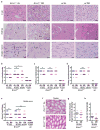Restricted diet delays accelerated ageing and genomic stress in DNA-repair-deficient mice
- PMID: 27556946
- PMCID: PMC5161687
- DOI: 10.1038/nature19329
Restricted diet delays accelerated ageing and genomic stress in DNA-repair-deficient mice
Abstract
Mice deficient in the DNA excision-repair gene Ercc1 (Ercc1∆/-) show numerous accelerated ageing features that limit their lifespan to 4-6 months. They also exhibit a 'survival response', which suppresses growth and enhances cellular maintenance. Such a response resembles the anti-ageing response induced by dietary restriction (also known as caloric restriction). Here we report that a dietary restriction of 30% tripled the median and maximal remaining lifespans of these progeroid mice, strongly retarding numerous aspects of accelerated ageing. Mice undergoing dietary restriction retained 50% more neurons and maintained full motor function far beyond the lifespan of mice fed ad libitum. Other DNA-repair-deficient, progeroid Xpg-/- (also known as Ercc5-/-) mice, a model of Cockayne syndrome, responded similarly. The dietary restriction response in Ercc1∆/- mice closely resembled the effects of dietary restriction in wild-type animals. Notably, liver tissue from Ercc1∆/- mice fed ad libitum showed preferential extinction of the expression of long genes, a phenomenon we also observed in several tissues ageing normally. This is consistent with the accumulation of stochastic, transcription-blocking lesions that affect long genes more than short ones. Dietary restriction largely prevented this declining transcriptional output and reduced the number of γH2AX DNA damage foci, indicating that dietary restriction preserves genome function by alleviating DNA damage. Our findings establish the Ercc1∆/- mouse as a powerful model organism for health-sustaining interventions, reveal potential for reducing endogenous DNA damage, facilitate a better understanding of the molecular mechanism of dietary restriction and suggest a role for counterintuitive dietary-restriction-like therapy for human progeroid genome instability syndromes and possibly neurodegeneration in general.
Conflict of interest statement
The authors declare no competing financial interests.
Figures











Comment in
-
Ageing: Dietary protection for genes.Nature. 2016 Sep 15;537(7620):316-317. doi: 10.1038/nature19427. Epub 2016 Aug 24. Nature. 2016. PMID: 27556941 Free PMC article.
-
Ageing: Accelerated ageing slowed by reduced calorie intake.Nat Rev Endocrinol. 2016 Nov;12(11):623. doi: 10.1038/nrendo.2016.161. Epub 2016 Sep 16. Nat Rev Endocrinol. 2016. PMID: 27636726 No abstract available.
References
-
- Niedernhofer LJ, et al. A new progeroid syndrome reveals that genotoxic stress suppresses the somatotroph axis. Nature. 2006;444:1038–43. - PubMed
-
- Marteijn JA, Lans H, Vermeulen W, Hoeijmakers JH. Understanding nucleotide excision repair and its roles in cancer and ageing. Nat Rev Mol Cell Biol. 2014;15:465–81. - PubMed
-
- Vermeij WP, Hoeijmakers JH, Pothof J. Genome Integrity in Aging: Human Syndromes, Mouse Models, and Therapeutic Options. Annual Review of Pharmacology and Toxicology. 2016;56:427–45. - PubMed
Publication types
MeSH terms
Substances
Grants and funding
LinkOut - more resources
Full Text Sources
Other Literature Sources
Medical
Molecular Biology Databases

